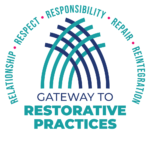“It is only when we prioritize building relationships with our students that they can learn and succeed in the classroom. Specifically, we see increased academic achievement, engagement, attendance, and grades, and we see decreased levels of challenging behaviors and school drop-out.”1,p.65
As a Restorative Practices trainer and consultant, I enjoy that every training opportunity is different. I never know exactly who will attend nor what may happen. Each training is unique because every participant is unique. I arrive on campus and typically train staff after school who have already spent a full day at work. Participants’ roles vary from teachers, paraprofessionals, counselors, yard or campus supervisors, to administrators, and custodians.

Reminder: Don’t pick-up the symbolic tug-of-war rope.
Recently, I was blessed to train a super-engaged and cooperative group of TK (Transitional Kindergarten) – 8th grade teachers. Almost all the curricula I’ve developed are created separately with content and specific examples for elementary staff and secondary staff. In this case, I had both, so I integrated examples to cover the gamut. I felt honored as one TK teacher said, “Thanks for including us. We’re usually forgotten.” As a former child development professor, how could I forget them?
Circle Components Foster Engagement
This past year, I started adding a circle component to every workshop because they engage participants, add value, and clearly demonstrate the power of circles.
This workshop offers several circles and begins with a check-in circle shaped more like an oval that fits our space. Educators move easily from a circle to a pair share, to a large group, to a small group content circle, and to a community-building circle woven throughout the workshop.
Typically, workshops are an hour, but today I have 75+ minutes. I plan a closing circle using the circle prompts that are typically used at the end of an all-day seminar. The prompts are, “Share an ah-ha moment from the workshop: I was surprised…; I learned…; or I realized…” These prompts provide real-time personal reflection, application, and/or action steps. The participants’ responses are a valuable and quick way to gather workshop feedback.
Relatable and Relevant
I’m intently listening to each statement when I realize what’s happening. By the end of the circle, every participant stated a relevant and relatable goal that ultimately summarized the workshop’s key points. I formatted their responses in a table so you can glean from the variety of do’s and don’ts they shared for not engaging in power struggles.
Do’s and Don’ts of Power Struggle Traps
| Don’ts | Do’s |
| I pick-up the power struggle rope more than I realized. | Use open, accepting body language. |
| I need to stop using sarcasm with students. | How to calm the student’s personal space. |
| Don’t try to get in the last word. | Remember to use proximity and “softer & closer.” |
| I need to stop trying to bully and intimidate students to embarrass them. | Keep verbal interactions respectful. |
| I need to Q-Tip – Quit Taking Things Personally. | I need to use more “diffusers,” i.e., “Hmmm,” “Interesting,” and “I never thought of that before.” |
| Stop putting students on blast, and stop yelling across the classroom. | Offer choices. |
| Don’t block escape routes. | Learn about the student’s backgrounds and home life. |
| Remember to apologize to students when I’m in the wrong. | |
| Reconnect with a student when the student returns if sent out of class. |
I am so proud of this teacher group. I excitedly share, “I want you to know that you just witnessed something amazing that doesn’t happen at every training. Every one of you shared something you’re going to stop or start doing because of the workshop. There’s a lot of power in making these changes. I truly appreciate your active participation.”
In some ways, it might be fun to experience this with all my workshop participants. But that would take away from the uniqueness and what may happen. I never know when I’ll need to access my own group management skills to engage an unwilling and unruly group. Fortunately, that rarely happens.
Sources
1. Causton, Julie and Kate McCleod. From Behaving to Belonging: The Inclusive Art of Supporting Students Who Challenge Us. Alexandria, VA: ASCD, 2020.
2. Image: flat-lay-sailor-strings-with-knot_23-2148753048 [freepik.com]

